Canada has a longstanding reputation as a leader in upholding and improving international human rights and security. But, as two of Canada’s most esteemed human rights defenders warned at Dalhousie’s annual Shaar Shalom lecture recently, the country risks losing its positive influence if citizens and lawmakers don’t step up soon to address emerging global security challenges.
The Honourable Bob Rae, ambassador and permanent representative of Canada to the United Nations in New York, and Lieutenant-General (Ret'd) the Honourable Roméo Dallaire, founder of the Dal-based Dallaire Institute for Children, Peace and Security, shared this and other views at the sold-out event.
Rae explained that historically Canada has often been at the centre of public debate about issues of human rights at the United Nations. Canada is also one of the top seven donors to the U.N. And while Canadians should view this history with a sense of pride, he said it’s key to continue this role.
“It's very important for us to live up to that tradition . . . and to be able to reflect it in what we do now and not just what we did. To say, 'Here are the things that we need to do in the future.'"
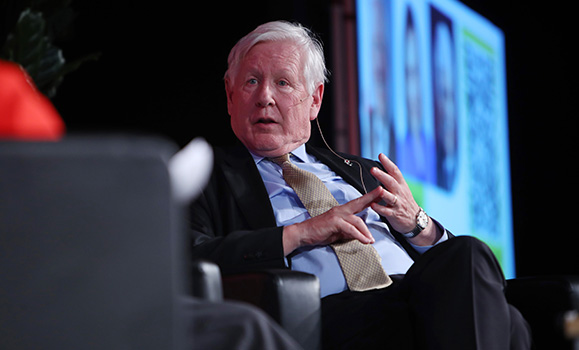
Dallaire observed that many Canadians today feel comfortable with our stable democracy at home but warned that Canada is extremely vulnerable to risks from conflicts beyond our borders that can lead to pandemics, terrorism, and human rights abuses.
To prevent rage from spreading, he said we need to pre-emptively influence security and prevent conflicts abroad.
“We have not punched over our weight,” said Dallaire. “The only time we came close to it was in World War II when . . . we were one of the three armies to go across those beaches. Since then, we have not. We have so much more yet to provide . . . I fear that we don't seem to want to get our political elites to want to engage in that type of building true security and peace in the future.”
Rae also encouraged Canada to take risks in engaging globally. “At our best, we've been creative and inventive,” he said. “Lester Pearson was creative and inventive when he said let's try to figure out how we can get a UN force that's able to intervene between two warring parties.”
Protecting children and youth
This year’s Shaar Shalom lecture covered a lot of territory, which is not surprising given the globe-spanning careers of the guest speakers. Dr. Shelly Whitman, executive director of the Dallaire Institute, moderated the discussion.
The need for a global strategy to stop the recruitment and use of children and youths in conflicts around the world emerged as a key theme.
“If we can give kids another avenue to go forward, we can cut off an important lifeline for gangsters and for military leaders,” said Rae. “They raise money through selling drugs, they’re killing people . . .This is just pure criminality.”
Population explosions in several countries have created a large cohort of young people who do not have enough activities, work and education, making them ripe targets for extremism, terrorism, violence and gangs. Figuring out how to engage and provide opportunities for these young people is critical, said Dallaire.
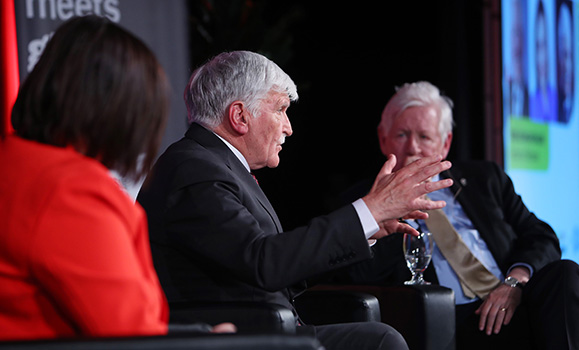
“Children used in conflicts create generational wars because that's all they know,” he said. “It's only by getting engaged with those who can in those countries influence the prevention of that recruitment that we will attenuate the use of these children.”
Grab your sneakers
Several audience questions focused on how individuals can make an impact.
Noting that 2.9 million aged 18-30-year-old did not cast a ballot in the last federal election, Dallaire advised young people to vote. “You have the balance of power in this democracy and you're not using it.”
Dallaire also suggested that every youth own a pair of sneakers that they’ve “soiled on the earth of a developing country. You've actually gone and heard, felt, smelt, listened to and tasted what is actually happening to 80 to 90 per cent of humanity. Bring that experience back home, and look at those sneakers every now and again and at what you might want to influence into the future in regards to fellow humans.”
Rae added that there are many opportunities to become engaged, but people tend to watch the world go by while looking at their phones and emails. “I just don't think we live in a world right now where we can afford to be bystanders.”
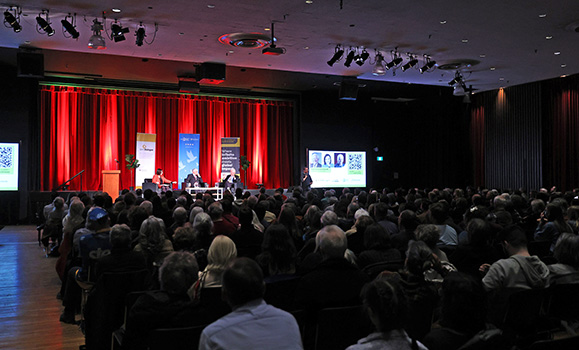
Leadership and intestinal fortitude
Dallaire recalled joining Canada's Senate as an “apprentice politician” and how disconcerting it was that his colleagues were so focused on the near term.
Rae echoed Dallaire’s take on the short-sightedness of modern politics. “If another person in government says to me, ‘What's the low-hanging fruit here . . . What are the quick wins at the UN and New York?’ We really have to fight back against these tendencies.”
Dallaire said that helping conflicted nations move toward freedom requires a long-term, multi-generational commitment.
“[Now] we're there for six months, or four years and then we're gone,” Dallaire said. “We don't have the intestinal fortitude . . . to find long-lasting solutions. We're not in the entrails of the frictions and trying to bring multi-disciplined solutions to bring that nation slowly into an atmosphere of security.”
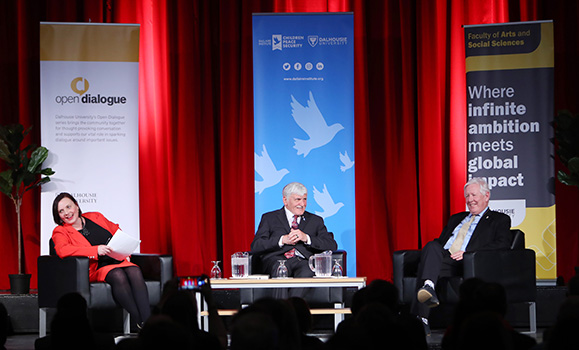
Hope for the future
Despite the struggles they’ve witnessed over decades, both speakers remain hopeful and energized.
Rae marvelled that technology today makes it possible to connect directly with citizens all over the world. “Some of the most compelling meetings I've had in the last while have been with women in Afghanistan, speaking to us from Afghanistan and talking to us very directly.”
Dallaire said he believes fundamentally that the world will move to lasting peace if we look to our youth.
“If we let these younger generations maximize their potential and force us to take risks…that will give us those solutions in which we can prevent conflicts and resolve the frictions without slaughtering each other,” he said.
“The youth of the world are so much more impatient and so much more equipped to be able to move the yardsticks towards peace than we ever were — and so I put a lot of faith in that.”
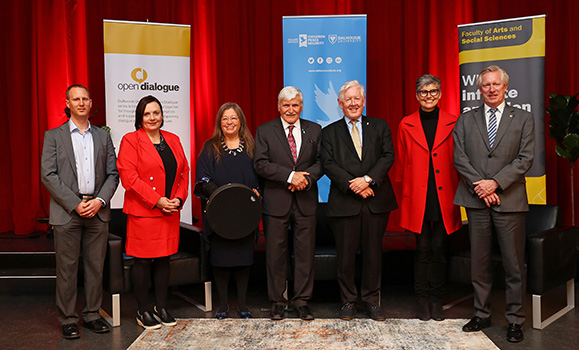
Watch the full 2023 Shaar Shalom lecture on YouTube.
The Shaar Shalom Lecture at Dalhousie University is made possible through the generosity of the Shaar Shalom Synagogue of Halifax and is co-sponsored by the Dallaire Institute, Dal’s Open Dialogue Live series and the Faculty of Arts and Social Sciences. It seeks to explore themes of tolerance, multiculturalism, diversity and difference in contemporary society, and demonstrates our shared interest in bringing in-depth discussion of these themes to wider civil society.
Comments
comments powered by Disqus

